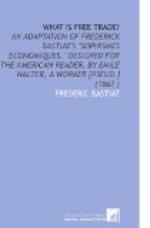It would be a too tedious undertaking to endeavor to point out all the fallacies of this Sophism. I will therefore limit myself to the consideration of it in three points.
You argue that the United States are overburdened with taxes, and deduce thence the conclusion that it is necessary to protect such and such an article of produce. But protection does not relieve us from the payment of these taxes. If, then, individuals devoting themselves to any one object of industry, should advance this demand: “We, from our participation in the payment of taxes, have our expenses of production increased, and therefore ask for a protective duty which shall raise our price of sale:” what is this but a demand on their part to be allowed to free themselves from the burden of the tax, by laying it on the rest of the community? Their object is to balance, by the increased price of their produce, the amount which they pay in taxes. Now, as the whole amount of these taxes must enter into the Treasury, and the increase of price must be paid by society, it follows that (where this protective duty is imposed) society has to bear, not only the general tax, but also that for the protection of the article in question. But, it is answered, let everything be protected. Firstly, this is impossible; and, again, were it possible, how could such a system give relief? I will pay for you, you will pay for me; but not the less still there remains the tax to be paid.
Thus you are the dupes of an illusion. You determine to raise taxes for the support of an army, a navy, judges, roads, &c. Afterwards you seek to disburden from its portion of the tax, first one article of industry, then another, then a third; always adding to the burden of the mass of society. You thus only create interminable complications. If you can prove that the increase of price resulting from protection, falls upon the foreign producer, I grant something specious in your argument. But if it be true that the American people paid the tax before the passing of the protective duty, and afterwards that it has paid not only the tax but the protective duty also, truly I do not perceive wherein it has profited.
But I go much further, and maintain that the more oppressive our taxes are, the more anxiously ought we to open our ports and frontiers to foreign nations, less burdened than ourselves. And why? In order that we may SHARE WITH THEM, as much as possible, the burden which we bear. Is it not an incontestable maxim in political economy, that taxes must, in the end, fall upon the consumer? The greater then our commerce, the greater the portion which will be reimbursed to us, of taxes incorporated in the produce which we will have sold to foreign consumers; whilst we on our part will have made to them only a lesser reimbursement, because (according to our hypothesis) their produce is less taxed than ours.




